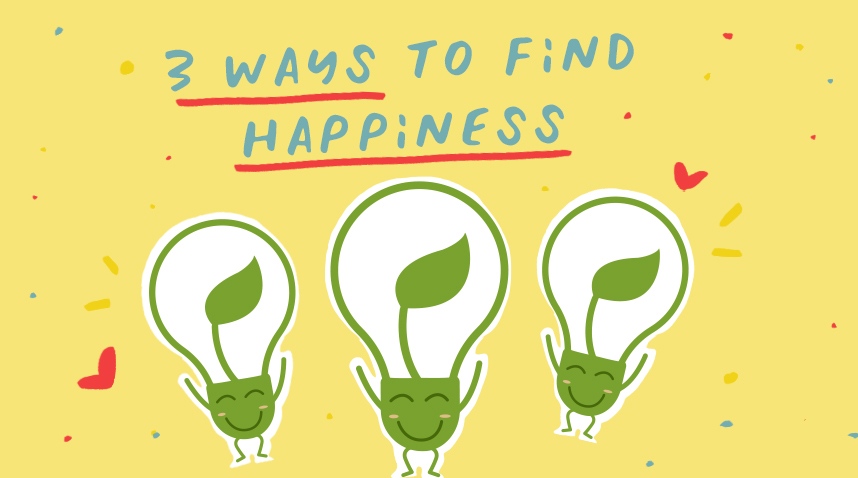TLDR: Do you want to feel more happiness and less anxiety and worry? There are 3 practical ways you can try to always find happiness in the little things in life.
Would you like to experience consistent happiness on a daily basis compared to worry, anxiety and stress? I think most sane people would answer yes to this question. But despite the many books written on happiness, why are we not getting happier but instead feeling more depressed? It seems our happiness is easily toppled. Just take away travel, social gatherings and nightlife, like what we witnessed during the pandemic, we tip over to mental dis-ease away from well being. Is consistent happiness really attainable? Here are 3 ways to always find happiness.
Changing Our Perception

If the title of this article sounds too good to be true – it is! Happiness, like attaining wealth, comes with work. Happiness does not come on a platter given to us by someone. All of us do not want to suffer. But yet we do. The culprit, or, the cause of our suffering is our mind’s constant clinging to feel secure. Security is finding safety from death and being loved unconditionally.
This article does not deal with finding security from death or unconditional love. Instead, suggestions are made here to help us change our perception in our daily life, so that we can continuously find opportunities to lift our minds.
Some of us cling onto perceptions that keep us suffering. Such as being upset at having our plans thwarted to feeling righteous and annoyed whenever we are challenged by another.
If we can change our perception little by little, we begin to feel that nothing is thwarting our life plan and it is not always necessary to have everything go our way.
1. Stop Comparing

We make comparisons everyday. We compare restaurants, the weather to fashion, movies and people. Making comparisons causes us to accept one thing and reject another. Although acceptance and rejections are of varying degrees, we nevertheless make up our minds about something and reject its opposite, unless we already have an open mind.
Making comparisons can make us miserable. Due to the Covid-19 pandemic, it has been difficult to visit the public pool as and when I like. So I joined a club pool and was very happy to bring my nephew along. I jumped into the pool, grateful. But my nephew was gloomy. The reason? The pool isn’t up to his standards compared to other pools where there are toys and slides for children to play with. He was happy he could sneak out of the house to play in the pool but yet was unhappy at the pool. Does this make sense?
My nephew is not behaving weirdly, rather he is only showing the reason for the constant lack of contentment in our hearts.
If he had remembered his fortune at being able to sneak out for an hour to relax by the pool, rather than to be stuck at home submerged in schoolwork, maybe he would be happier. He was making wrong comparisons.
Discern Wisely
Being wise is the ability to make sensible decisions based on experience and knowledge. To discern wisely is to be able to have good judgment of the quality of your own thoughts and those of others.
If we can discern wisely instead of making endless comparisons, we might be grateful instead of feeling discontented with our lives. Not comparing others’ characters does not mean we befriend everyone who could be a bad influence. Being able to discern wisely means we can judge others’ character and qualities with compassion. Instead of comparing if this or that person is good or bad, we can instead help those who are willing to listen to adopt good qualities such as kindness and love instead of indifference and anger. As for those who already have good qualities we can also befriend them to incline our own minds towards joy.
Being able to discern also means we are grateful for the food we are offered or we choose to eat, even if it does not meet the taste and standards of another restaurant.
2. Accept Things as They are

Look at your life so far. You may find that most of your expectations were not met (unless you have a very contented mind). We get married and expect to be happy-ever-after. But how many people find that? We may have pictured our lives to turn out a certain way, but did it all turn out as we had visualized?
What you plan in a day may not even turn out the way you expected. You could be planning a lovely day for your partner and his or her level of surprise or happiness may not match your expectation. You may think doing something for your child today makes him/her happy but they end up sulking.
Truth is, everything that comes our way can be joyful.
Learn to change your mind

One of the weekend mornings I was looking forward to meditating for 3 to 4 hours. I did manage 1.5 hours but found my helper unwell. She was hired to help out with looking after my father who has dementia. I stopped my meditation and went out to buy the day’s necessities. When I came home, I found my father ill as well. It turned out I went out too early and the food shop had not yet opened. So I made 2 trips to buy food. I also realized my father was having diarrhoea, so he could not eat all the food I bought. I could have been upset that my plan to meditate was upended and that I spent more than I should.
But I have learned through mindfulness that happiness does not come from outer events but from what I think about them.
Ayya Khema said, “Don’t blame the trigger,” and this has made a deep impression on me. It means that if I no longer have anger within me, it is not possible for anyone to trigger this state of mind.
We need not keep anger, discontentment, or sadness in our minds if we keep replacing them with joy and happiness. Instead of being upset that my plan is not going accordingly, I was grateful to be able to serve my helper and father. It made me happy.
3. Everything is Already Broken
The third way to always find joy is to realize that everything is already broken. A beautiful flower is already on its way to wilt. A sunny day does not last forever. Civilizations rise and fall. Our minds are mostly joyful at new things. From a baby to a living flower, to a new star or a new home. We hide aged and dying people, and quickly repaint or mend a crack in our homes to cover the ugliness.
Most of our lives are spent covering up the fact of life – that death is already within everything around us, including our own bodies.
No one likes to grow old and sick, because we know how society treats decay. Read the news and see how our society abhors death. Death is always perceived as unfortunate, when the fact is, we all know, no one can live forever.
Treasure What is and Let Go

Knowing that everything is already broken does not mean we become indifferent. Indifference is not joy.
Seeing that everything is fading teaches us to be present to whoever we are with. It allows us to appreciate the flower that has not yet decayed.
But when it dies, we are not sad as well because we have given it the attention it needs.
Understanding that everything is coming apart also allows us to accept things when they are broken – from relationships to a favourite broken antique vase. We know the lively home we have now will not last forever. This helps us love everyone (including the unlovable because they are a part of our lives) and everything for that moment, with mindfulness to let go of every moment. There is nothing we can hold onto, not even the universe we live in because it is changing and moving towards a black hole to be devoured.
Our world and the universe are always changing.
Our bodies are heading towards decay, but it does not mean we cannot always find joy in the little things in life.
Wise Steps:
- To change your perception, it is helpful to meditate for at least 10 mins a day.
- Be grateful for what you have, so that external factors have lesser control over your moods.
- Learn to see that doing things for others is the same as doing something for yourself because serving others can bring joy to your heart.


